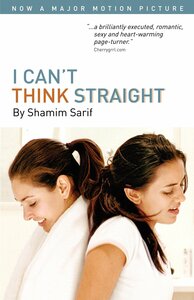Take a photo of a barcode or cover
Fun and well-developed. I saw the movie years ago, and I could picture it as I read this; a very thorough adaptation.
Good characters, pace and storyline.
Good characters, pace and storyline.
lighthearted
medium-paced
Plot or Character Driven:
Character
Strong character development:
Yes
Loveable characters:
Yes
Diverse cast of characters:
Yes
Flaws of characters a main focus:
Yes
Cross-posted at Outlaw Reviews and at Shelf Inflicted
This was the perfect book to read while I was snowed in and work was closed.
Tala is a Palestinian living in London. She’s very outgoing and forthright. After three engagements, her parents really hope this one will stick. Hani is a very nice guy and Tala loves him. Leyla is an Indian Muslim. She works at a job she’s not passionate about, while her true love is writing. Other than a mutual attraction, Tala and Leyla have little in common. They both come from strict, traditional cultures that don’t have a very positive view about homosexuality. Despite these difficulties, the two women eventually fall in love.
The romance happens a little fast, and the plot is rather predictable. Still, I gulped it down in one sitting and enjoyed this light and pleasant story. What I liked most about it is the glimpse into middle-eastern culture, the clash between traditional and western values, religious and class differences, and the interactions between lovers, friends, and family.
There was a large cast of interesting, well-developed secondary characters and other minor characters that could have been fleshed out a little more. I was especially curious about Tala’s uncle, Ramzi, who was likely gay. It would have been so much easier on Tala if they were closer and opened up to each other about their sexuality. Another interesting minor character was Rani, Tala’s mother’s Indian housekeeper who occasionally spits in her coffee. I get that she probably resented the family’s wealth, but I didn’t understand her acrimony.
If you are looking for graphic sex scenes, look elsewhere. This is a thoughtful and humorous story about two young women who eventually find themselves and choose a different path. The ending made me smile.
Maybe I'll watch the film while the book is still fresh in my mind.
This was the perfect book to read while I was snowed in and work was closed.
Tala is a Palestinian living in London. She’s very outgoing and forthright. After three engagements, her parents really hope this one will stick. Hani is a very nice guy and Tala loves him. Leyla is an Indian Muslim. She works at a job she’s not passionate about, while her true love is writing. Other than a mutual attraction, Tala and Leyla have little in common. They both come from strict, traditional cultures that don’t have a very positive view about homosexuality. Despite these difficulties, the two women eventually fall in love.
The romance happens a little fast, and the plot is rather predictable. Still, I gulped it down in one sitting and enjoyed this light and pleasant story. What I liked most about it is the glimpse into middle-eastern culture, the clash between traditional and western values, religious and class differences, and the interactions between lovers, friends, and family.
There was a large cast of interesting, well-developed secondary characters and other minor characters that could have been fleshed out a little more. I was especially curious about Tala’s uncle, Ramzi, who was likely gay. It would have been so much easier on Tala if they were closer and opened up to each other about their sexuality. Another interesting minor character was Rani, Tala’s mother’s Indian housekeeper who occasionally spits in her coffee. I get that she probably resented the family’s wealth, but I didn’t understand her acrimony.
If you are looking for graphic sex scenes, look elsewhere. This is a thoughtful and humorous story about two young women who eventually find themselves and choose a different path. The ending made me smile.
Maybe I'll watch the film while the book is still fresh in my mind.
Romance isn't my normal genre, but a book about a Christian Palestinian woman from Lebanon falling in love with a Muslim British Indian woman? I mean, how could I pass something like that up?
I was a little disappointed that, for a romance book, this had almost no romance in it. Tala and Leyla are ostensibly in love, but they spend no time together. They get into a "debate" when they first meet, which consists entirely of Tala being a prat and needling at Leyla about her beliefs. They go on a date that we barely get to see, spending more time on a summary after the fact than in the moment. Then they go on a weekend trip where they have sex for the first time and everything else that happens is off-stage. For the rest of the book, Tala and Leyla are separated (mostly in entirely different countries) and not interacting at all.
We are told that they are in love, but we don't get to see them in love. If they aren't fighting, Tala is stalking Leyla while Leyla tries to avoid her. They have very little chemistry, at least as far as I could tell.
Then again, it would be hard for them to have chemistry when they barely have personalities. Both seem to act, feel, and say whatever the plot needs them to, and, when we do get personal details about them, those details are frustratingly superficial. Leyla is a writer, but a writer of what? Tala loves her two published stories, but what are they about? What does she like about them? What do they tell Tala about who Leyla is as a person?
Tala, for her part, is starting a business to sell candles and things manufactured in Lebanon. She talks about how much of a difference this could make to the lives of the people making her products, but then it's dropped and she never really seems to care about the poor after that. She never seems to have any particular interest in the things she sells, either. She never shows some of her wares off to Leyla, never tells her about the sweet old widow who can afford to care for her grandson now that she's picked up candle-making, never brings Leyla to meet a family making her products.
The story is more about Tala and Leyla's families. They are mostly one-dimensional, but they are interestingly so. There's a good story to be had in how each individual family member reacts to Tala and Leyla's relationship. Some of it has made it onto the page, but the story ends quickly after the women come out, so we don't get to spend too much time in each family member's head.
My last complaint is that the book really could have used an extra round of editing. There are some questionable word choices, as well as some muddled timelines (the example the pops immediately to mind is in chapter 5: Ali calls Leyla on Sunday night, then Leyla and Tala go on a date the next evening, and then Leyla goes shopping with her mom the day after that, a Monday). These are silly issues that shouldn't have made it into final print.
All that said, the book is competently written. This was in no danger of going into my Did Not Finish pile! I was interested from start to finish, and I wanted to see where it was going. I liked most of the characters, I just felt that Leyla and Tala were short-changed. Ideally, this book would have been 100 pages longer, with a nice big section near the beginning where Leyla and Tala see each other and talk, and where we get a chance to understand why they love each other.
I was a little disappointed that, for a romance book, this had almost no romance in it. Tala and Leyla are ostensibly in love, but they spend no time together. They get into a "debate" when they first meet, which consists entirely of Tala being a prat and needling at Leyla about her beliefs. They go on a date that we barely get to see, spending more time on a summary after the fact than in the moment. Then they go on a weekend trip where they have sex for the first time and everything else that happens is off-stage. For the rest of the book, Tala and Leyla are separated (mostly in entirely different countries) and not interacting at all.
We are told that they are in love, but we don't get to see them in love. If they aren't fighting, Tala is stalking Leyla while Leyla tries to avoid her. They have very little chemistry, at least as far as I could tell.
Then again, it would be hard for them to have chemistry when they barely have personalities. Both seem to act, feel, and say whatever the plot needs them to, and, when we do get personal details about them, those details are frustratingly superficial. Leyla is a writer, but a writer of what? Tala loves her two published stories, but what are they about? What does she like about them? What do they tell Tala about who Leyla is as a person?
Tala, for her part, is starting a business to sell candles and things manufactured in Lebanon. She talks about how much of a difference this could make to the lives of the people making her products, but then it's dropped and she never really seems to care about the poor after that. She never seems to have any particular interest in the things she sells, either. She never shows some of her wares off to Leyla, never tells her about the sweet old widow who can afford to care for her grandson now that she's picked up candle-making, never brings Leyla to meet a family making her products.
The story is more about Tala and Leyla's families. They are mostly one-dimensional, but they are interestingly so. There's a good story to be had in how each individual family member reacts to Tala and Leyla's relationship. Some of it has made it onto the page, but the story ends quickly after the women come out, so we don't get to spend too much time in each family member's head.
My last complaint is that the book really could have used an extra round of editing. There are some questionable word choices, as well as some muddled timelines (the example the pops immediately to mind is in chapter 5: Ali calls Leyla on Sunday night, then Leyla and Tala go on a date the next evening, and then Leyla goes shopping with her mom the day after that, a Monday). These are silly issues that shouldn't have made it into final print.
All that said, the book is competently written. This was in no danger of going into my Did Not Finish pile! I was interested from start to finish, and I wanted to see where it was going. I liked most of the characters, I just felt that Leyla and Tala were short-changed. Ideally, this book would have been 100 pages longer, with a nice big section near the beginning where Leyla and Tala see each other and talk, and where we get a chance to understand why they love each other.
I picked this up on a whim and I really, really, enjoyed this. I am so glad to read about lesbians in other cultures other than just white ones. The story was nuanced and balanced and I loved it. Really highly recommend it.
Very good fun, although could have used an editor.
Like most books that focus on queer women that have a film adaptation, I Can’t Think Straight made its first impression on me by way of its movie. In some ways, that impression – particularly since I read the book years after seeing the movie, so the memory really is just an impression – remains true. Much of the dialog and all but a few scenes are a one-to-one match between the movie and the book. Prose, however, provides greater context than the movie manages and is not stilted by shaky performances.
I Can’t Think Straight tells the story of Tala, a Jordanian whose well-to-do Christian family fled Palestine, and Leyla, a Muslim Indian who has grown up in England. Tala is in the midst of her fourth engagement; Leyla has little interest in dating but has been with her boyfriend for two months. Both are under pressure from their families to make these relationships work.
When the two meet, sparks fly – in that Tala’s abrasive questioning leaves Leyla confused and defensive. But beyond that, a friendship is quickly formed despite their differences, and while Tala would like to write this off as a close, intimate friendship, Leyla admits to herself that she’s falling for the other woman.
Almost as soon as Tala and Leyla come together, they are pulled apart by Tala’s family. Each must confront her own family and grow in her own way before they can repair the friendship that was broken.
In novel format, one gets a better sense of the characters and their motivations, and the pair’s progression from strangers to friends to lovers to near-strangers again. Tala’s family members, in particular, are given more depth, both as individuals and in their politics.
If you liked aspects of the movie but felt it came up short in some areas, you might get more out of reading the book.
I Can’t Think Straight tells the story of Tala, a Jordanian whose well-to-do Christian family fled Palestine, and Leyla, a Muslim Indian who has grown up in England. Tala is in the midst of her fourth engagement; Leyla has little interest in dating but has been with her boyfriend for two months. Both are under pressure from their families to make these relationships work.
When the two meet, sparks fly – in that Tala’s abrasive questioning leaves Leyla confused and defensive. But beyond that, a friendship is quickly formed despite their differences, and while Tala would like to write this off as a close, intimate friendship, Leyla admits to herself that she’s falling for the other woman.
Almost as soon as Tala and Leyla come together, they are pulled apart by Tala’s family. Each must confront her own family and grow in her own way before they can repair the friendship that was broken.
In novel format, one gets a better sense of the characters and their motivations, and the pair’s progression from strangers to friends to lovers to near-strangers again. Tala’s family members, in particular, are given more depth, both as individuals and in their politics.
If you liked aspects of the movie but felt it came up short in some areas, you might get more out of reading the book.







